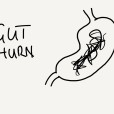ACRL was ridiculously amazing this year. I feel energized, affirmed, and hopeful (and completely exhausted and sick since it ended). The programming was so high-quality and relevant that, in most cases, I had at least four options in every time slot on my planner that I wanted to attend. Luckily, ACRL records all the sessions and will be putting them online in the next few weeks; there are so many I want to listen to! It’s really nice to go to a conference when you feel like you’re actually in a position to implement some of the things you’ve heard about.
I have such warm feelings for my amazing colleagues at PCC, but I also have such warm feelings for the community college library community. Everyone has been so welcoming and positive about my move. It feels like marrying into a family, but only in the good ways. I feel so very lucky. I think community college librarianship is the best kept secret in our profession and I’m just happy I got the chance to figure it out.
Secret seems to be the problem though. Two years ago, I heard a good deal of complaining on Twitter that there wasn’t much programming for or by community college librarians at ACRL 2013. This was definitely not the case this year, where there were more sessions by community college librarians than any one person could attend. What was interesting this year was that, in many of those sessions, only community college librarians attended. I went to a great session presenting projects from the Assessment in Action program that were done by community colleges, and the session was attended almost entirely by community college librarians. And yet there was so much any academic librarian interested in assessment would have gotten out of their very realistic and honest (warts and all) descriptions of their assessment projects. We had about 80 people at our talk on what it takes to build a culture of assessment (where we compared our results from community colleges to those from the first study), but only a handful of attendees were not community college librarians. I totally understand that these might have seemed to be only relevant to community college librarians, but I also think there is a tendency to believe that community college libraries have more to learn from university libraries than vice versa. Maybe that’s true when it comes to data management, scholarly communications, and home-grown technologies, but the singular focus on student success makes community colleges a fantastic source of learning about instruction, outreach, and assessment.
Portland Community College looks to Portland State University a great deal (especially in the library) for ideas and to create a consistent experience for students moving from one school to the other. But, in my time at Portland State, most of my colleagues were not interested in the community colleges that provided around 2/3 of their student body. I’ll admit I was guilty of it as well until I was contacted by a wonderful librarian at PCC (who is now my colleague) who saw a presentation Amy Hofer and I gave at the 2013 Oregon Library Association/Washington Library Association Conference and wanted to meet. Amy and I started to meet with fantastic librarians from Portland and Mount Hood Community Colleges to talk about our learning outcomes and instructional practice. During the worst summer of my professional life, they were a ray of sunshine and hope. When I first saw the brilliant work my now colleague, Pam Kessinger, did around curriculum mapping, I became ashamed of the fact that I originally thought we at PSU had more to teach than we had to learn from the community colleges. I was so wrong. Interestingly, Amy and I are now both working for community colleges.
I was so happy to see the presentation at ACRL about how Appalachian State and their local community colleges met to collaborate and discuss learning outcomes development. Similar work was done years ago in Oregon and that work blossomed into a group, ILAGO (Information Literacy Articulation Group of Oregon), that connects community college, university, and K-12 librarians around our shared information literacy and advocacy goals.
There is so much Portland State could learn from Portland Community College about how to build a culture of assessment right. Having served on the Assessment Council at PSU, I can say that there was only lip service paid at the administrative level to the importance of assessment and no real support for assessment was provided in the years I was at the University. You can’t even find learning outcomes for courses (if they exist at all), and while the departments were required to draft program-level outcomes a few years ago, they were not published anywhere on the websites of most departments (I had to ask for a copy from Institutional Research). A couple of departments were doing really great assessment work, but they were the exception rather than the norm.
The College is still on the road to building an assessment culture, but they’re doing it in such a smart way. Every department is required to do assessment, but the faculty in each department are empowered to decide what they want to assess and how to approach it. And they are given support, in the form of faculty mentors associated with the Learning Assessment Council. And the people to whom we have to report our assessment progress each year and who give us feedback on it are our peers on the Learning Assessment Council. The faculty are driving the bus. The departments I’ve seen doing assessment seem to be really focused on doing it to improve their programs for their students. It’s very inspiring. And so nice, as a new librarian learning about her liaison areas, to be able to see the course-level outcomes for every course listed prominently on the College website. I’m not saying every community college is doing amazing assessment work, but, according to our research, they seem to be doing more than BA, MA, and PhD-granting institutions.
Take a look at the results Lisa Hinchliffe and I shared at ACRL from our study of the factors that facilitate and hinder librarians in building an assessment culture, and you’ll see that community college librarians are ahead of the game in terms of assessment practices. [Sorry the formatting got a little messed up in slideshare, but the content is all there.]
Community college libraries have longer been scrutinized by outside entities and so have longer had to play the accountability game. Their more singular focus on student success and learning encourages a focus on assessment for and about learning. And I’d argue that their long history of being resource-constrained (by-and-large) has led in many cases to real creativity (I think this is also sometimes helped by having leaner organizations with less bureaucracy). There’s a lot we could learn from the approaches community colleges have taken to engaging in assessment practice.
This is starting to feel like a guilt trip for university librarians, but I think community college librarians share the blame if they’re not sharing the great work they do. When you look at the literature, a lot less publishing is happening in community college libraries. Seeing how much busier I am in my current job with reference, instruction, and library-wide projects than I ever was in previous positions, I totally understand why, but I don’t think we can expect people to be interested in our work if we are not out there sharing it. Lisa and I exhorted our audience to share their assessment work. Whether you publish it in a journal, at a conference, on a listserv, or a blog, what matters most is that you’re sharing it (though I’d love to see more people publishing in places that provides open access to their work). Librarians of every type could benefit so much from knowing the great work that goes on in community college libraries.
I also think it would be helpful to not use the term “community college library” in the title of articles and presentations, unless something is really only relevant to community college libraries. I think it may make people from other types of academic libraries think it isn’t for them. The work my incredible colleague at PCC, Sara Seely, presented in our ACRL presentation on teaching sources and source evaluation for lifelong information literacy was from a community college context, but was totally relevant to any librarian teaching information literacy. I understand the desire to have community college-specific programming, but I think having the speakers be from a community college is good enough and would expose more people to our great work. So much of what we do and struggle with is not unique to community colleges.
Let’s share the great work we do and break down the barriers between community college librarians and academic librarians in other contexts. There is so much we can learn from each other!
Image credit: 99u







Pingback: You could learn a lot from us: community colleg...
Thanks, Meredith!
Glad you have joined us and I heartily agree about breaking down barriers and sharing wisdom and experience (I’d include public libraries, as well).
As to national meetings: we must show up when we can (including speaking, being on committees, volunteer) and be innovative and active to help other community college librarians join us remotely in $ and staff is unavailable to them.
We serve far too many students nationally not to be a bigger presence at the conferences and in the higher education conversations online and in press.
Thank you for this blog post, Meredith! Elizabeth has asked me to share the link to the Prezi from our panel (the AiA community college folks): https://prezi.com/pod_u4ebdgzo/sustaining-success/
Pingback: Latest Library Links 10th April 2015 | Latest Library Links
This is something that is increasingly important for ACRL, especially as the number of community college students grows and our students increasingly move between 2 and 4-year schools (both during their initial higher education and as part of lifelong learning). We have made progress in bringing a wider array of voices to ACRL programs, but we can do more. Also interesting, in my experience, to see how these connections may be happening more effectively at the local/state level, whether through ACRL chapters or through independent efforts like the Illinois Information Literacy Summit.
Meredith: Super post that outlines much of what I heard from my community college colleagues at ACRL conference. For those of us at CC libraries who can travel and participate at the national level, we must do so! We represent so many student voices and experiences that must be heard. Perhaps identfying ways that CC librarians can effectively and efficiently share their experiences should be a priority for CJCLS.
Thanks so much for your articulate voice on this issue.
Beth
Thanks for this post, Meredith. The paragraph about the lack of publishing being done by community college librarians really hit home for me, especially this statement, “Seeing how much busier I am in my current job with reference, instruction, and library-wide projects than I ever was in previous positions, I totally understand why, but I don’t think we can expect people to be interested in our work if we are not out there sharing it.” My cross-departmental, all-encompassing position (seriously, compared to a previous employer, I’m at least three different people with three different specialties) doesn’t require me to publish, present, and/or share my work with the library world, but I do, regardless of my to-do list, because I expect 4-year college and university libraries to share their experiences with me and because I love my job.
That’s awesome Amanda! I wish everyone would make it as much of a priority, though having its importance stressed by one’s administrator(s) makes a huge difference.